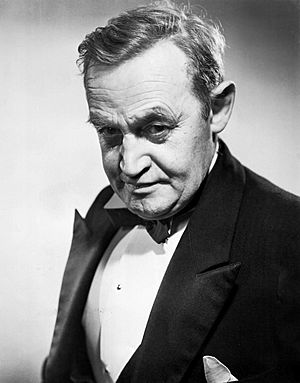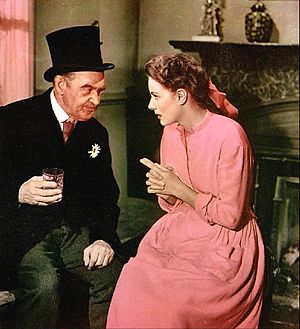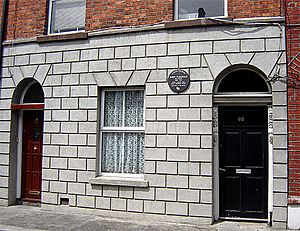Barry Fitzgerald facts for kids
Quick facts for kids
Barry Fitzgerald
|
|
|---|---|

Fitzgerald in 1945
|
|
| Born |
William Joseph Shields
10 March 1888 Dublin, Ireland
|
| Died | 4 January 1961 (aged 72) Dublin, Ireland
|
| Occupation | Actor |
| Years active | 1924–1961 |
| Relatives | Arthur Shields (brother) |
Barry Fitzgerald (born William Joseph Shields on March 10, 1888 – died January 4, 1961) was a famous Irish actor. He worked in plays, movies, and on television for almost 40 years. He appeared in many well-known films. Some of these include Bringing Up Baby (1938), The Long Voyage Home (1940), How Green Was My Valley (1941), and The Quiet Man (1952).
For his role in Going My Way (1944), he won an Academy Award for Best Supporting Actor. He was also nominated for the Academy Award for Best Actor for the same role. After this, the rules for the Academy Awards were changed so that actors could not be nominated twice for the same part. Barry Fitzgerald was the older brother of another Irish actor, Arthur Shields. In 2020, The Irish Times newspaper named him one of Ireland's greatest film actors.
Contents
Early Life and First Jobs
Barry Fitzgerald was born William Joseph Shields in Dublin, Ireland. His father was Irish, and his mother was German. He had an older brother, Arthur Shields, who also became an actor.
He went to Skerry's College in Dublin. After college, he started working for the government. In 1911, he became a junior clerk at the Dublin Board of Trade. Later, he worked at an unemployment office. He once said it was an "easy job, full of leisure."
Becoming an Actor
Starting at the Abbey Theatre
Fitzgerald was very interested in acting. He began performing with amateur drama groups. In 1915, he joined his brother Arthur Shields at the famous Abbey Theatre in Dublin. He chose the stage name Barry Fitzgerald. This was so his bosses at his government job wouldn't find out he was acting.
At first, Fitzgerald had small roles at the Abbey Theatre. His big chance came in 1919 in a play called The Dragon. Even after this, he kept his government job and acted part-time until 1929.
In 1924, Fitzgerald earned £2.10 a week at the Abbey. That year, he was in the first-ever performance of Juno and the Paycock. This play was written by the famous playwright Seán O'Casey. Fitzgerald played the character Captain Jack Boyle.
He also received praise for his acting in Paul Twyning in 1925. The next year, he played Fluther Good in O'Casey's play The Plough and the Stars.
O'Casey wrote a special part for Fitzgerald in his play The Silver Tassie. However, the Abbey Theatre did not want to produce this play. It was later produced in London in 1929. Fitzgerald decided to leave his government job to join the London show. At 41 years old, he finally became a full-time actor.
Moving to Movies
Fitzgerald made his first movie in 1930. It was Alfred Hitchcock's film version of Juno and the Paycock, filmed in London.
In 1932, Fitzgerald traveled to the United States with the Abbey Players. They performed plays like Things That Are Caesar's and The Far-off Hills. They returned to the U.S. in 1934 for a longer tour, performing many different plays.
Fitzgerald also appeared in a short Irish silent film called Guests of the Nation in 1935. This movie was only shown in Ireland for many years.
Hollywood Success
In 1936, Fitzgerald and other Abbey Theatre actors went to Hollywood. They were there to film The Plough and the Stars, directed by John Ford. Fitzgerald decided to stay in Hollywood. He quickly found many jobs as a character actor. He played supporting roles in movies like Bringing Up Baby (1938) and The Dawn Patrol (1938).
He worked on several films for RKO Pictures. He also returned to Broadway in New York for a play called The White Steed in 1939.
After returning to Hollywood, Fitzgerald worked with John Ford again in The Long Voyage Home (1940). He also appeared in The Sea Wolf (1941) and another Ford film, How Green Was My Valley (1941).
In 1941, Fitzgerald and his brother Arthur Shields starred in a Broadway play called Tanyard Street. Critics loved Fitzgerald's performance. The New York Times said he was "the incarnation of the comic spirit."
Going My Way and Becoming a Star

Barry Fitzgerald became a leading actor in 1944. This happened when Leo McCarey cast him with Bing Crosby in the movie Going My Way. The film was a huge hit! Fitzgerald's role as Father Fitzgibbon was very popular. He won the Academy Award for Best Supporting Actor and was also nominated for Best Actor for this role.
After Going My Way, Paramount Pictures signed Fitzgerald to a long contract. He continued to play supporting roles in films like I Love a Soldier (1944) and None But the Lonely Heart (1944).
In 1945, Fitzgerald played the lead role in And Then There Were None. This movie was based on a famous book by Agatha Christie. By January 1945, he was earning $75,000 for each film.
Fitzgerald made more films with John Farrow, including California (1947). He also reunited with Bing Crosby in Welcome Stranger (1947).
He played the lead detective in the successful film The Naked City (1948). He then made a third movie with Bing Crosby, Top o' the Morning (1949). Fitzgerald also appeared in The Story of Seabiscuit (1949) with Shirley Temple. In 1950, he made his television debut in an episode of The Ford Theatre Hour.
Later Career and Final Years
In 1952, Fitzgerald traveled to Italy to star in a comedy film. That same year, he worked with John Ford again in the classic movie The Quiet Man. This film was shot in Ireland. He also filmed Happy Ever After in Ireland.
Fitzgerald appeared on television shows like Lux Video Theatre and Alfred Hitchcock Presents. He had a supporting role in The Catered Affair (1956) and was the main actor in the British comedy Rooney (1958). His last film was the Irish movie Broth of a Boy (1959).
Barry Fitzgerald never married. He returned to live in Dublin, Ireland, in 1959. He had brain surgery in October 1959. He seemed to get better but went back to the hospital in late 1960. He passed away from a heart attack on January 4, 1961.
Barry Fitzgerald has two stars on the Hollywood Walk of Fame. One is for his work in movies, and the other is for his television career.
Filmography
| Year | Title | Role | Notes |
|---|---|---|---|
| 1924 | Land of Her Fathers | ||
| 1930 | Juno and the Paycock | The Orator | |
| 1935 | Guests of the Nation | Captured of British Soldier | |
| 1936 | The Plough and the Stars | Fluther Good | |
| 1937 | Ebb Tide | Huish | |
| 1938 | Bringing Up Baby | Mr. Gogarty | |
| Four Men and a Prayer | Trooper Mulcahay | ||
| Marie Antoinette | Peddler | Uncredited | |
| The Dawn Patrol | Bott | ||
| 1939 | Pacific Liner | Britches | |
| The Saint Strikes Back | Zipper Dyson | ||
| Full Confession | Michael O'Keefe | ||
| 1940 | The Long Voyage Home | Cocky | With John Wayne. |
| The San Francisco Docks | The Icky | ||
| 1941 | The Sea Wolf | Cooky | With Edward G. Robinson, John Garfield, and Ida Lupino |
| How Green Was My Valley | Cyfartha | ||
| Tarzan's Secret Treasure | O'Doul | With Johnny Weissmuller. | |
| 1943 | The Amazing Mrs. Holliday | Timothy Blake | |
| Two Tickets to London | Captain McCardle | ||
| Corvette K-225 | Stooky O'Meara | ||
| 1944 | Going My Way | Father Fitzgibbon | Academy Award for Best Supporting Actor Golden Globe Award for Best Supporting Actor - Motion Picture New York Film Critics Circle Award for Best Actor Nominated–Academy Award for Best Actor |
| I Love a Soldier | Murphy | ||
| None but the Lonely Heart | Henry Twite | ||
| 1945 | Incendiary Blonde | Michael 'Mike' Guinan | |
| Duffy's Tavern | Bing Crosby's Father | ||
| And Then There Were None | Judge Francis J. Quinncannon | ||
| The Stork Club | Jerry B. 'J.B.'/'Pop' Bates | ||
| 1946 | Two Years Before the Mast | Terrence O'Feenaghty | |
| 1947 | California | Michael Fabian | |
| Easy Come, Easy Go | Martin L. Donovan | ||
| Welcome Stranger | Dr. Joseph McRory | ||
| Variety Girl | Himself | ||
| 1948 | The Naked City | Detective Lt. Dan Muldoon | |
| The Sainted Sisters | Robbie McCleary | ||
| Miss Tatlock's Millions | Denno Noonan | ||
| 1949 | Top o' the Morning | Sergeant Briany McNaughton | |
| The Story of Seabiscuit | Shawn O'Hara | ||
| 1950 | Union Station | Inspector Donnelly | |
| 1951 | Silver City | R.R. Jarboe | |
| 1952 | Ha da venì... don Calogero! | Don Calogero | |
| The Quiet Man | Michaleen Oge Flynn | With John Wayne. | |
| Lux Video Theatre | Barry Flynn | episode: The Man Who Struck It Rich | |
| 1954 | Tonight's the Night | Thady O'Heggarty | |
| 1955 | Alfred Hitchcock Presents | Harold 'Stretch' Sears | episode: Santa Claus and the Tenth Avenue Kid |
| 1956 | The Catered Affair | Uncle Jack Conlon | |
| 1958 | Rooney | Grandfather | |
| 1959 | Broth of a Boy | Patrick Farrell |
Radio Appearances
| Year | Program | Episode/source |
|---|---|---|
| 1952 | Lux Radio Theatre | Top o' the Morning |
See Also
 In Spanish: Barry Fitzgerald para niños
In Spanish: Barry Fitzgerald para niños
- List of actors with Academy Award nominations
- List of people on stamps of Ireland
 | James B. Knighten |
 | Azellia White |
 | Willa Brown |


